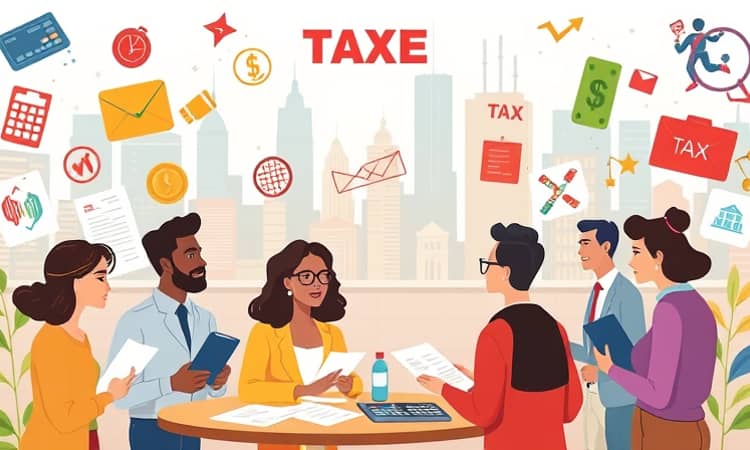Understanding Taxes: Key Concepts Everyone Should Know

Taxes play a crucial role in society, affecting individuals, businesses, and governments alike. Understanding how taxes work is essential for anyone who wants to make informed financial decisions. This article aims to provide a comprehensive overview of key tax concepts that everyone should be familiar with, from types of taxes to their purposes and how they are collected.
By breaking down the information into digestible sections, we hope to demystify the often complex world of taxation and empower readers to navigate their own tax obligations with confidence and clarity.
Whether you're a seasoned taxpayer or a newcomer to the world of finance, understanding taxes is a vital part of financial literacy. Let's delve deeper into the fundamentals of taxes and what you need to know.
What Are Taxes?

At its core, a tax is a compulsory financial charge or levy imposed by a government on individuals and businesses. Taxes serve as a primary source of revenue for governments, enabling them to fund various public services, infrastructure, and social programs essential for a functioning society.
Taxes can be levied in various forms, including income tax, sales tax, property tax, and more. Each type serves a specific purpose and is calculated differently, reflecting the government's needs and societal priorities.
Tax obligations vary widely based on factors such as individual income, wealth, and specific goods or services acquired. Understanding these intricacies is vital for compliance and effective financial planning.
Types of Taxes

There are several primary categories of taxes, each of which plays a critical role in the overall tax system. It is essential to recognize the different types to better understand how taxation affects personal and corporate finances.
Common types of taxes include:
- Income Tax
- Sales Tax
- Property Tax
- Corporate Tax
- Estate Tax
These various tax types highlight how governments collect revenue based on different economic activities and assets individuals and businesses possess. Recognizing the differences can help taxpayers prepare better for their liabilities.
The Purpose of Taxes

The primary purpose of taxes is to raise revenue for government expenditures. This revenue is utilized for various essential services, including education, healthcare, infrastructure, and social safety nets that support citizens in need.
Moreover, taxes play a significant role in redistributing wealth within society, helping to address economic inequalities and providing funding for public goods and services that benefit everyone.
How Are Taxes Collected?

Taxes are collected through various mechanisms, depending on the type of tax. Typically, they are withheld from income by employers or paid directly to government agencies by individuals and businesses. Understanding how taxes are collected can alleviate surprises during tax season.
- Withholding: Employers deduct taxes directly from employees' paychecks.
- Estimated Payments: Self-employed individuals and businesses often make quarterly estimated tax payments to cover potential liabilities.
- Filing a Tax Return: Taxpayers submit annual tax returns that calculate their total tax obligations, deduct any pre-paid taxes, and determine if they owe additional money or will receive a refund.
Familiarity with the collection process is essential in managing your finances and ensuring compliance with tax regulations. Failure to understand your tax obligations can lead to penalties or unexpected financial burdens.
Taxable Income and Deductions

Taxable income refers to the portion of income that is subject to taxation after accounting for any allowable deductions. Identifying what counts as taxable income is critical in determining your overall tax liability.
- Wages and salaries
- Business income
- Rental income
- Interest and dividends
Understanding taxable income enables individuals to create effective strategies for reducing their tax burden through the use of deductions and credits.
Tax Credits vs. Tax Deductions

Tax credits and deductions are essential tools taxpayers can use to minimize their tax liabilities. While both serve the purpose of reducing the amount you owe, they do so in different ways.
- Tax Deductions lower your taxable income, which in turn reduces the overall amount of tax you owe.
- Tax Credits directly reduce your tax bill dollar-for-dollar, providing a more beneficial impact than deductions of the same amount.
Understanding the distinction between tax credits and deductions can significantly influence your tax strategy, leading to more efficient tax management and potential savings. The choice between utilizing credits or deductions often depends on your financial situation and specific tax benefits available.
Progressive, Regressive, and Proportional Taxes

Taxes can also be classified based on their structure and how they affect taxpayers differently. These classifications help us understand the fairness and impact of various tax systems on society.
- Progressive Tax: Higher incomes pay a higher percentage in taxes, promoting equity.
- Regressive Tax: Lower-income individuals pay a higher percentage, often seen in sales taxes.
- Proportional Tax: Everyone pays the same percentage, regardless of income level.
This classification highlights the debate surrounding tax fairness and equity. Understanding these tax structures enables taxpayers to engage in discussions about tax reform and policy changes that impact their financial situations.
Filing Your Taxes

Filing your taxes is an annual responsibility that requires individuals to report their income, calculate their tax obligations, and pay any amounts owed. The process can seem daunting, but understanding the steps involved can simplify the experience.
Many resources, including tax software, accountants, and online guides, are available to assist individuals in preparing and filing accurate tax returns. Familiarity with the filing process is essential to avoid penalties and ensure compliance with tax obligations.
Conclusion

Understanding taxes is a crucial part of financial literacy, enabling individuals and businesses to make informed decisions and fulfill their obligations. With a clear grasp of the various types of taxes, their purposes, and how they are collected, taxpayers can navigate the complexities of the tax system more effectively.
As tax laws and regulations continue to evolve, staying informed about changes and seeking guidance when needed will be key to successful tax management. Embracing the complexities of taxes will ultimately lead to better financial outcomes and a deeper understanding of one's responsibilities as a citizen.






